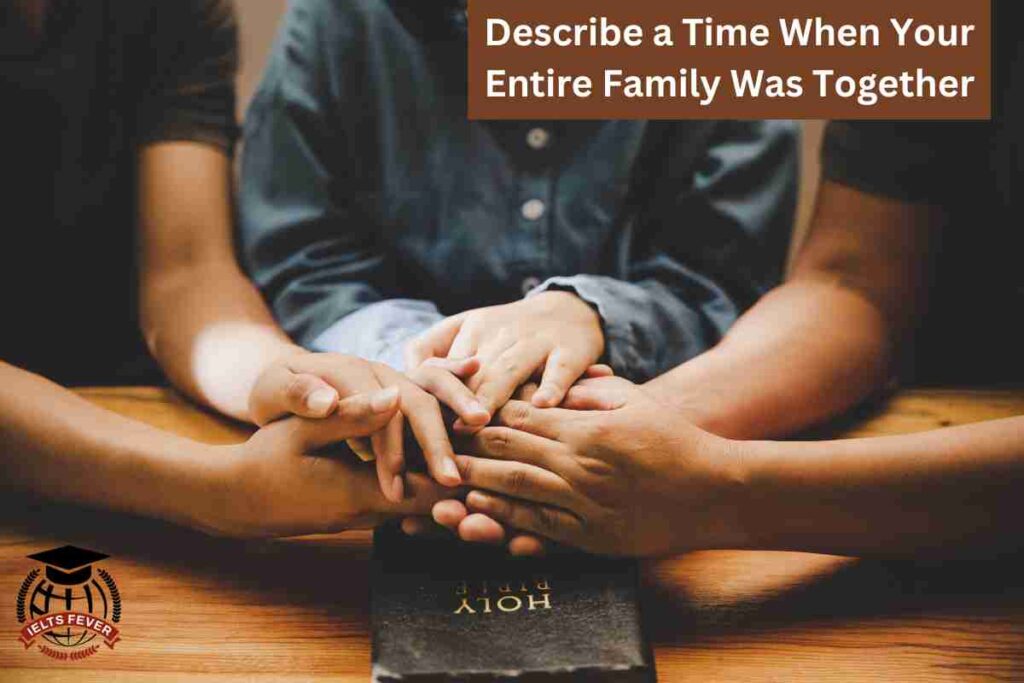Describe a Time When Your Entire Family Was Together
- When was it?
- Where was it?
- Why was the entire family together?
Sample Answer of Describe a Time When Your Entire Family Was Together
One of the most memorable times when my entire family was together occurred two summers ago. It was the occasion of my grandparents’ golden wedding anniversary. Given the significant milestone they were marking, it was only fitting that the celebrations be grand, and that’s precisely what they were.
The gathering took place at our ancestral home in the countryside, a rustic, spacious house surrounded by meadows and tall pine trees. It’s a place that holds countless memories for every member of our family, from the cheerful games of hide-and-seek played by the younger ones to the countless tea sessions and profound conversations shared by the elders on the wide veranda.
The main reason for this grand assembly was to celebrate the five decades of love and togetherness that my grandparents had shared. It was also an opportunity to bridge the geographical divides. With cousins flying in from Australia, uncles from Canada, and aunts from various parts of Europe, the reunion turned into an international affair.
The house echoed with laughter, stories of yesteryears, and the playful banter of children. Old photographs were pulled out, leading to nostalgic journeys down memory lane. This gathering was a testament to the bonds that hold us together, reminding us of the love and shared history that makes our family unique.
Follow ups of Describe a Time When Your Entire Family Was Together
Question 1:- Is family important in your country?
Answer – In my country, family is considered extremely important and forms the backbone of society. Family units are often close-knit, providing emotional and financial support to each other. Traditions and family gatherings are highly valued, and it’s common for multiple generations to live in close proximity or even under the same roof. The emphasis on family is ingrained in our culture, and it plays a crucial role in shaping individual values and social behavior.
Question 2:- Who should be responsible for caring for the elderly? Should it be the family or the government?
Answer – I believe the responsibility for caring for the elderly should be shared between the family and the government. While the family provides emotional support and understands the individual needs of their elderly members, there are specialized needs like healthcare and assisted living that may be beyond the family’s capability. Government support through social welfare programs can fill these gaps, ensuring that the elderly receive comprehensive care. This collaborative approach benefits everyone involved.
Question 3:- How has the size of the average family changed in your country in the last few decades?
Answer – In the last few decades, the average family size in my country has noticeably shrunk. Earlier, it was common to have large families with multiple children and extended relatives living together. However, due to urbanization, career demands, and a shift in societal values, families have become smaller and more nuclear. The trend now leans towards having one or two children, and extended family members often live separately, though they may still maintain close emotional ties.
Question 4:- How do you think families will change in the future?
Answer – I anticipate that families will continue to evolve in the future, adapting to societal and technological changes. With increasing globalization and career opportunities, family members might be more geographically dispersed than before. Advances in technology could make virtual gatherings more common, partially compensating for physical distance. I also expect that as social norms change, the structure of families may become more diverse, including various configurations like single-parent families, child-free couples, and non-traditional family units.
Question 5:- Should husbands and wives have different roles within the family?
Answer – I believe that the roles of husbands and wives within a family should be based on mutual agreement and individual strengths rather than adhering to traditional gender roles. In today’s evolving society, both partners often contribute financially and share domestic responsibilities. Deciding roles based on skills and preferences allows for a more equitable and harmonious family life. Flexibility and adaptability should be the guiding principles rather than rigid, predefined roles.
Pages Content

